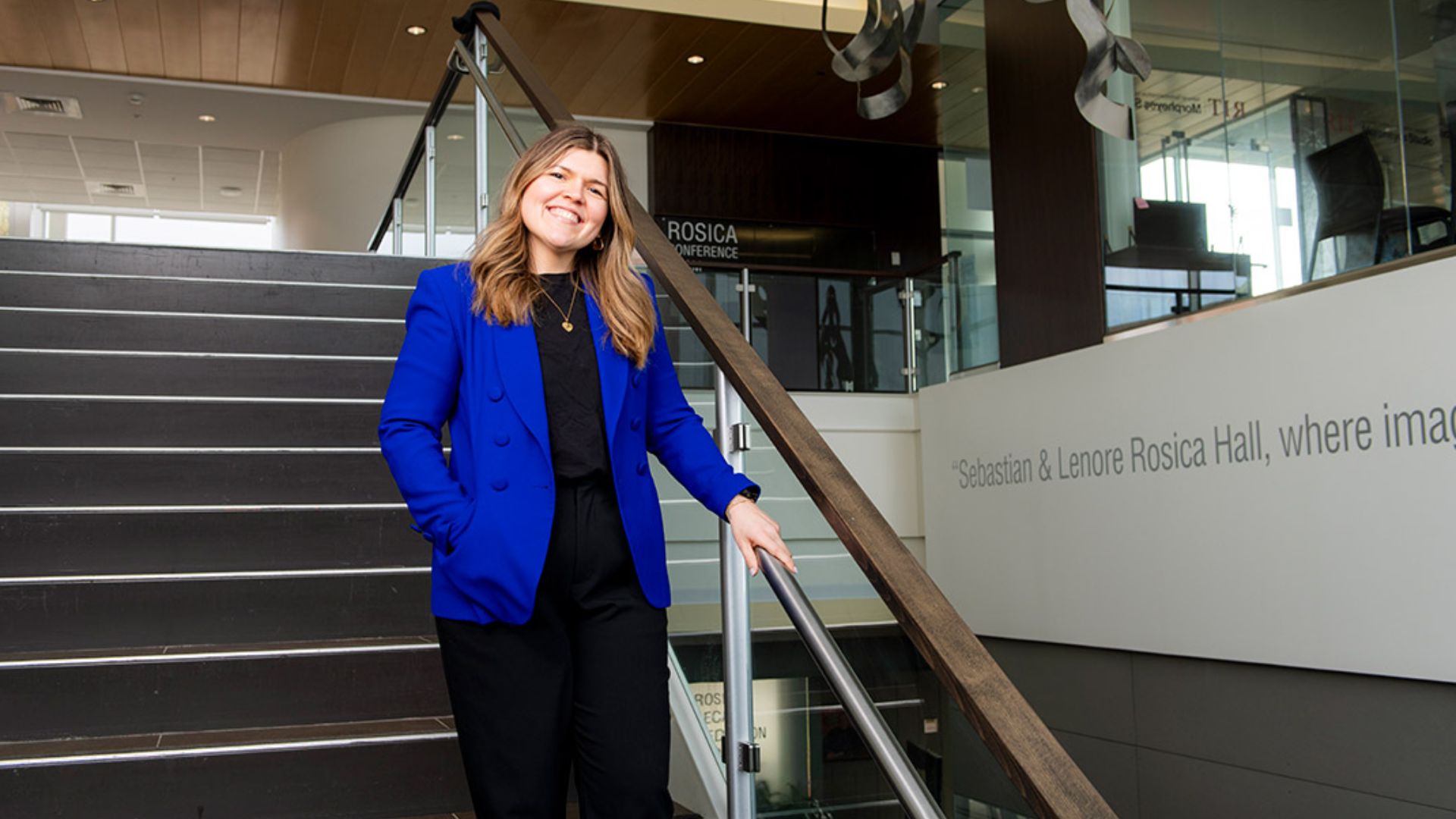Local News
Corinna Hill from NTID inspires students to explore and embrace the rich history of Deaf culture through engaging teaching methods

Rochester, New York – For Corinna Hill, teaching was never part of the original plan. With a deep passion for history and a doctoral degree from the University of Rochester, she initially envisioned a career spent curating museum exhibits and uncovering forgotten narratives of the past. But fate had other ideas. Today, as an assistant professor in the National Technical Institute for the Deaf’s (NTID) Department of Liberal Studies, Hill is not only shaping the minds of her students but also earning high praise for her dedication to teaching. This year, she was honored with Rochester Institute of Technology’s (RIT) Richard and Virginia Eisenhart Award for Excellence in Teaching, a prestigious recognition given to tenure-track faculty members with less than three years of full-time teaching experience.
Hill specializes in 19th- and 20th-century Deaf and disability history, exploring how access to language, technology, medicine, and social relationships have influenced Deaf individuals over time. While her academic expertise is impressive, it’s her engaging and innovative teaching style that sets her apart. Instead of focusing solely on historical facts and timelines, she emphasizes the lived experiences of Deaf individuals, making history personal, interactive, and relevant to her students.
A Unique Approach to Teaching Deaf History
Hill’s classes are anything but conventional. She uses humor, interactive discussions, and creative activities to help students connect with the past. One of her most popular assignments is a “meme challenge,” where students create humorous but insightful content related to Deaf history. Her goal is to make learning fun while fostering critical thinking and historical awareness.
“I tell my students that history isn’t just about memorizing dates and names,” Hill explains. “It’s about understanding people’s lived experiences, their stories, and how these stories still impact us today.”
Her classes attract students from a variety of majors and backgrounds, including deaf, hard-of-hearing, and hearing students. She sees this diversity as a strength, creating a dynamic learning environment where different perspectives enrich the conversation. From engaging debates to deep dives into key historical events, she encourages students to think critically and explore the significance of Deaf culture in society.
Creating a Supportive and Challenging Learning Environment
Hill believes that education is a two-way street, and she makes this clear to her students from the start. At the beginning of each semester, she provides them with a list: what she expects of them and what they can expect from her.
“Teaching is a two-way street. They should expect me to actively show up, to be available during office hours, to be current on research, and to challenge them. And I expect them to give me their best efforts in return.”
By setting clear expectations, Hill fosters a classroom atmosphere where accountability and mutual respect go hand in hand. She challenges students to engage deeply with the material, encouraging them to see the relevance of history in their own lives.
For her hearing students, these lessons are particularly eye-opening. Many have never considered their own role in Deaf history and culture. Through her teaching, Hill helps them recognize that their perspectives on language and power dynamics can either contribute to progress or reinforce existing barriers.
A Passion for Preserving and Sharing Deaf History
Although Hill is now deeply committed to Deaf history, she once hesitated to focus her research on this area. As a deaf historian, she was concerned about being seen as a “token” representative. But over time, she realized the importance of telling stories that had been overlooked or misrepresented.
“There are so many untold stories, so many misinterpreted narratives,” Hill says. “I realized that if I want to change that, I have to be part of the effort to tell them.”
Her passion for uncovering forgotten histories is now a driving force in her career. She hopes to continue expanding research opportunities for students, encouraging them to explore topics that resonate with their own identities and experiences. By giving them the tools to analyze and interpret history, she empowers them to become active participants in shaping the narrative of Deaf culture.
Looking Ahead: Inspiring the Next Generation
As Hill looks to the future, her focus remains on challenging, inspiring, and supporting her students. She wants them to walk away from her classes with a deeper appreciation for Deaf history—and a recognition of their own place in it. More than anything, she wants them to have fun while learning, embracing history not as a collection of distant facts but as a living, evolving story that continues to shape the present.
“I want to challenge them, inspire them—and encourage them to have lots of fun while doing it, too.”
With her innovative teaching style, dedication to historical truth, and passion for education, Corinna Hill is not just teaching history—she’s bringing it to life. And in the process, she is helping a new generation of students understand and appreciate the richness of Deaf culture.

-

 Local News9 months ago
Local News9 months agoNew ALDI store close to Rochester to begin construction in late 2025 or early 2026
-

 Local News9 months ago
Local News9 months agoRochester Lilac Festival announces exciting 127th edition headliners
-

 Local News7 months ago
Local News7 months agoCounty Executive Adam Bello and members of the county legislature celebrate exceptional young leaders and advocates at the 2025 Monroe County Youth Awards
-

 Local News7 months ago
Local News7 months agoThe 2025 Public Market Food Truck Rodeo series will begin this Wednesday with live music by the Royal Bromleys